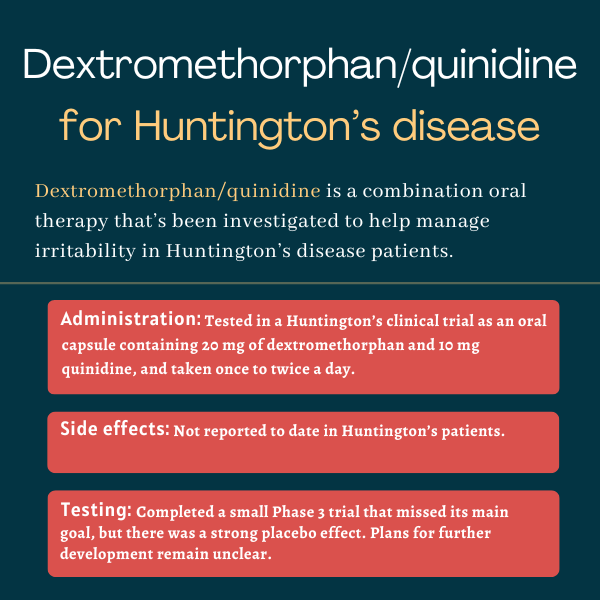
Dextromethorphan/quinidine for Huntington’s disease
Last updated Dec. 4, 2024, by Marisa Wexler, MS

What is dextromethorphan/quinidine for Huntington’s disease?
Dextromethorphan/quinidine is a combination oral therapy that has been explored as a potential strategy to help manage irritability in people with Huntington’s disease.
It’s approved in the U.S., under the brand name Nuedexta, to treat pseudobulbar affect, a condition marked by uncontrolled bouts of crying or laughing that aren’t related to a person’s emotional state. The disorder is commonly seen in people with other neurodegenerative diseases, including Alzheimer’s and Parkinson’s. Nuedexta is marketed for this indication by Otsuka America Pharmaceutical.
Therapy snapshot
| Treatment name: | Dextromethorphan/quinidine |
| Administration: | Tested in Huntington’s in the form of oral capsules |
| Clinical testing: | Completed a small Phase 3 trial that failed to meet its main goal; plans for further development are uncertain |
How does dextromethorphan/quinidine work in Huntington’s disease?
Huntington’s disease is a genetic disorder that causes progressive damage to the brain, resulting in symptoms that include abnormal movements and emotional dysregulation. Irritability is a common mental health symptom of Huntington’s and is reported to affect up to 70% of patients and has a significant impact on patients and those around them.
No treatment is approved for Huntington’s-associated irritability and the condition is usually managed with off-label medications.
Dextromethorphan/quinidine is a fixed-dose combination therapy that’s designed to modulate the activity of two receptor proteins in the brain. Increased activity of NMDA receptors in Huntington’s seems to make nerve cells more vulnerable to death. Sigma-1 receptors regulate a range of cellular processes commonly impaired in Huntington’s and other neurodegenerative diseases.
Dextromethorphan works by simultaneously blocking NMDA receptors and activating sigma-1 receptors, while quinidine prolongs dextromethorphan levels in the body. While the details aren’t fully understood, modulating these brain signaling pathways is thought to be how the therapy affects emotional regulation.
Dextromethorphan/quinidine is therefore expected to help ease irritability in people with Huntington’s.
How will dextromethorphan/quinidine be administered in Huntington’s?
Dextromethorphan/quinidine is available in oral capsules containing 20 mg of dextromethorphan and 10 mg quinidine. In the single trial to date that tested dextromethorphan/quinidine in Huntington’s patients, the therapy was given as one capsule, once or twice a day.
Dextromethorphan/quinidine in Huntington’s clinical trials
The University of Texas Health Science Center at Houston sponsored a small Phase 3 clinical trial (NCT03854019) that tested dextromethorphan/quinidine against a placebo in 20 people with Huntington’s-related irritability.
Eligible patients had to score higher than 14 on the Irritability Scale, a standardized test that measures irritability on a scale from 0 to 42, with higher numbers reflecting worse irritability.
The participants were randomly assigned to take an oral capsule of either dextromethorphan/quinidine or a placebo once a day for one week, then twice daily for four weeks, and once daily for another week.
The study’s main goal was to evaluate whether treatment was superior to a placebo at easing irritability, as assessed with the Irritability Scale, with a 4-point score drop being considered a clinically meaningful reduction.
Secondary goals included changes in behavioral, motor, and cognitive symptoms, as well as functional independence, all assessed with validated measures.
The trial ended in November 2022, and while the results haven’t been published to date, they were shared in some scientific meetings and posted on the trial’s Clinicaltrials.gov page.
At the study’s start, the patients assigned the combination treatment had significantly less severe irritability than those in the placebo group, based on scores of the Irritability Scale and the irritability/aggression subscale of the Problem Behaviors Assessment-Short Version (PBA-s).
According to abstracts submitted for presentation at 2023 and 2024 meetings, there was a strong placebo effect, as both the treatment and placebo groups saw a significant score reduction in the Irritability Scale.
Specifically, scores dropped by a mean of 8.8 points, or 32%, with dextromethorphan/quinidine, and 7.6 points, or 27.5%, with a placebo. This group difference didn’t reach statistical significance, meaning the trial failed to meet its main goal.
Similar findings were observed in the PBA-s’ irritability/aggression subscale, with the combo treatment resulting in a greater score reduction (42% vs. 33%), but the difference not meeting statistical significance.
There were also no significant differences between the groups regarding changes in other secondary measures, although a greater proportion of patients given dextromethorphan/quinidine were deemed by clinicians to have improved (44.5% vs. 33.4%).

Common side effects of dextromethorphan/quinidine
Full results of the single trial testing dextromethorphan/quinidine in Huntington’s patients have not been published to date, so the therapy’s side effect profile remains unclear.
Data posted to the therapy’s page showed that adverse events reported more commonly in patients given the treatment combo relative to those on a placebo included:
- headache
- nausea
- dizziness
- loss of appetite and weight loss
- increased libido
- increased apathy, or lack of interest or motivation
- high blood pressure
- COVID-19.
Huntington’s Disease News is strictly a news and information website about the disease. It does not provide medical advice, diagnosis or treatment. This content is not intended to be a substitute for professional medical advice, diagnosis, or treatment. Always seek the advice of your physician or other qualified health provider with any questions you may have regarding a medical condition. Never disregard professional medical advice or delay in seeking it because of something you have read on this website.
Recent Posts
- FDA requests additional clinical trial of Huntington’s gene therapy AMT-130
- A log cabin miles from anywhere was just what the doctor ordered
- The invisible battle of staying present with Huntington’s disease
- Combining 2 drugs could slow nerve cell death in Huntington’s: Study
- Your voice matters to the Huntington’s disease community


